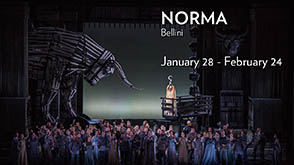
 Highly Recommended **** Even among great fans of the opera, it’s relatively rare to hear live evidence of an audience having been impacted emotionally by the story (as opposed to whistling at a singer’s technique). Before Kevin Newbury’s new-to-Chicago production of Norma opened at the Lyric on January 28, the only other time I witnessed such enthusiasm was when CPS high school students on a class trip booed the evil Scarpia in Tosca. But the duet “Mira, o Norma” between Berwyn native Sondra Radvanovsky in the title role and Elizabeth DeShong as Adalgisa elicited widespread murmurs of sympathy on Saturday, proving that the 1831 opera truly does possess dramatic power when skilled acting and Vincenzo Bellini’s beloved music work in tandem.
Highly Recommended **** Even among great fans of the opera, it’s relatively rare to hear live evidence of an audience having been impacted emotionally by the story (as opposed to whistling at a singer’s technique). Before Kevin Newbury’s new-to-Chicago production of Norma opened at the Lyric on January 28, the only other time I witnessed such enthusiasm was when CPS high school students on a class trip booed the evil Scarpia in Tosca. But the duet “Mira, o Norma” between Berwyn native Sondra Radvanovsky in the title role and Elizabeth DeShong as Adalgisa elicited widespread murmurs of sympathy on Saturday, proving that the 1831 opera truly does possess dramatic power when skilled acting and Vincenzo Bellini’s beloved music work in tandem.
A staple of Romanticism which inspired Richard Wagner, Bellini’s Norma is set during the Roman conquest of Gaul. Norma is the chief druidess, the religious leader of the oppressed Celts, who anticipate the overthrow of their hated occupiers. But Norma has secretly had a long-running affair which has produced two children with the Roman leader, Pollione (Russel Thomas, in a trance induced by some interfering deity). She delays the uprising for as long as possible, telling her people that their god (interpreted by Newbury as a bull) will be angry if they strike too soon. But unbeknown to her, Pollione has already abandoned her for a novice druidess, Adalgisa, causing him to suffer guilt, but accept that the gods wish for him to change lovers. Adalgisa and Norma do not know at the start of the play that they are rivals, but in time, Adalgisa has cause to fear Norma’s great wrath.
Conductor Riccardo Frizza makes an enviable Lyric debut with this production, which he also conducted in New York. The overture has a stirring martial quality, with Bellini’s melodies woven in to suggest how the war and love triangle fuel each other. The chorus, led by Michael Black, enjoys several moments in which to express barely suppressed fury before letting it pour forth and Newbury gives them more business than some opera directors, although they are still oddly immobile in crowd scenes. Their onstage leader is Andrea Silvestrelli in the role of Norma’s father, Oroveso, a looming inquisitor with a dark, stately timbre.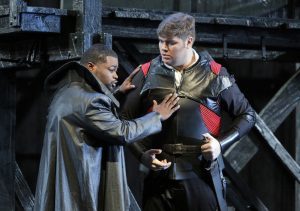
People listening to the performance on the radio may have noticed that Radvanovsky was unfortunately raspy on a few high notes and wondered what the fuss was about. But in person, she’s an incredibly charismatic performer and makes Norma a character we admire and fear for. Even having read the libretto and the synopsis, I was tricked into forgetting Norma’s ulterior motives during her call for peace and was caught up in her brief reconciliation with Adalgisa before either of them figured out the truth of their affairs. Credit for Norma’s rich characterization also has to go to librettist Felice Romani, who worked an unusual amount of psychological depth into a dramatic piece from this time period. Norma’s aria “Casta diva” is Bellini’s most famous and may have been the direct inspiration for the term bel canto, but when heard only in isolation, it’s easy to forget what a dramatically intense moment in comes at. Norma is secretly praying for a peaceful solution because she is surrounded by people calling for blood and is under immense pressure to deliver it. Those with Radvanovsky in person hung on her every note because her delivery perfectly conveyed Norma’s joy at the piece of hard-won happiness she had found and her determination to defend it.
Also working in Radvanovksy’s favor is her easy camaraderie with DeShong. Norma and Adalgisa looked quite natural as old friends during their scenes together. This is, in large part, the story of a female friendship, and it is a complicated one to the end. Norma’s rapid decisions at the end of the opera truly feel like they are made in the moment; though we never doubt that she loves her children, what she will do with Pollione and Adalgisa seems, for a moment, in doubt. The set, by David Korins, costumes, by Jessica Jahn with hair and make-up by Sarah Hatten, and lighting, by Duane Schuler, make a visually impressive production, located within a fortress that indicates the Gauls still have some power. It climaxes with the appearance of a massive wooden bull. I only wish we could have seen it put to its sacrificial purpose instead of having the ending immolation confusingly implied. It would have been an ideal conclusion.
Norma runs for three hours and five minutes with one intermission, with performances as follows:
February 5 at 2:00 pm
February 9 at 2:00 pm
February 13 at 7:30 pm
February 18 at 7:30 pm
February 24 at 7:30 pm
Performances are at the Civic Opera House, 20 N. Wacker Drive, Chicago. The Lyric offers parking deals with Poetry Garage at 201 W Madison St. if inquired about in advance. Tickets are $20-369; to order, visit LyricOpera.org or call 321-827-5600.
To see what others are saying, visit www.theatreinchicago.com, go to Review Round-Up and click at “Norma.”

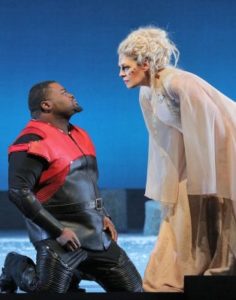

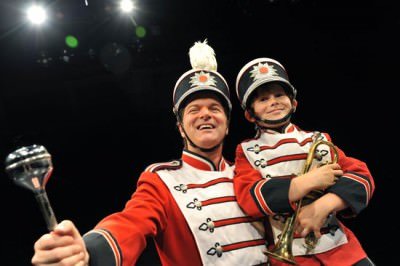

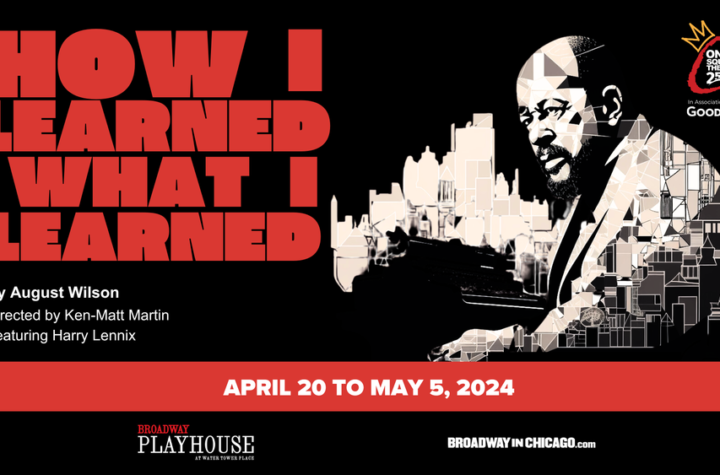

More Stories
“Joe Turner’s Come and Gone”
“How I Learned What I Learned” reviewed by Julia W. Rath
“How to Know the Wild Flowers: A Map” reviewed by Julia W. Rath